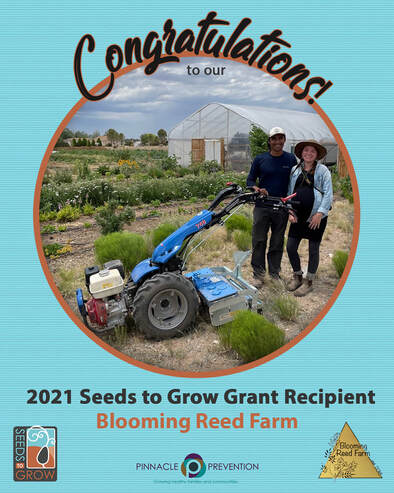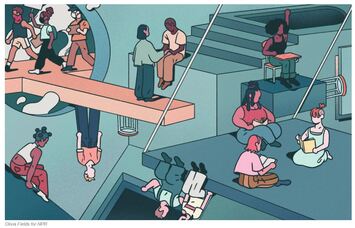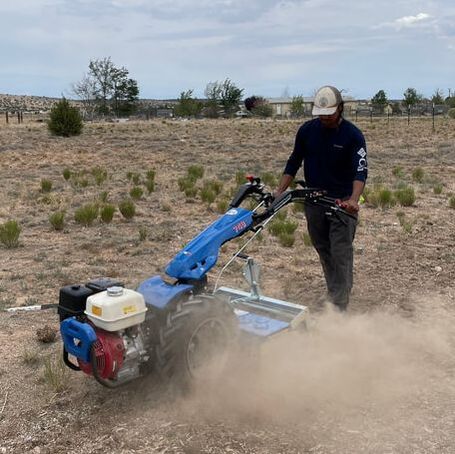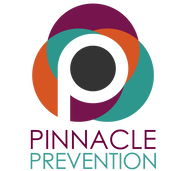 Can you imagine doing all the work for a small scale, organic farm by hand? We can’t either, which is why we are overjoyed to announce our 2021 Seeds to Grow Grant Recipient, Blooming Reed Farm of Paulden, Arizona! Blooming Reed farmers Juan and Keeton Aguiar provide Arizonans with locally grown organic vegetables, nutritious herbs, and breathtakingly beautiful flowers with the goal of minimizing the disturbance to the soil. Sustainable agriculture can be very labor-intensive, but with the appropriate equipment, farmers can maximize profits by increasing crop yields, improving crop quality, and reducing expenses. We’d like to give special thanks to Erich Shultz of Steadfast Farm for his technical support and expertise in choosing the appropriate agricultural equipment and tools for the location. He provides unwavering support to the regional farmers of our Arizona food system, and he played a big part in making this happen. We would also like to thank Whole Foods for helping to support us in this initiative. Seeds to Grow is an annual funding opportunity that supports the heart of our food system with seed funding for farm equipment and essentials for Arizona's small farmers. For more information on Seeds to Grow, visit pinnacleprevention.org
2 Comments
 'Not Racist' Is Not Enough: Putting In The Work To Be Anti-Racist - Eric Deggans 'Not Racist' Is Not Enough: Putting In The Work To Be Anti-Racist - Eric Deggans When someone says change is hard…believe them. Here we are, more than a year into our commitment as an organization to center anti-racism and equity in our practice. We’ve been bringing these hard conversations and questions into our work by asking ourselves and our partners to explore how our own identities work to uphold these power structures. Simply, self and system analysis, with the acknowledgment that this alone is not enough, and with increased humility, hard changes, power shifts and action should follow. Sounds good, right? Well, if it were that easy…. Here we are today, ready, and willing to share some honest reflections and lessons learned…thus far. We say thus far because we have much to do to continue to challenge our own perceptions, norms, and white conditioning. The reality is that this kind of work is lifelong, never-ending, often pain-staking slow…and full of humanness…errors, and hardship. Change is hard. We all know this. People will say this, agree to this, and sign up for the thought of change…in theory. The reality? That’s when things get tricky. And, if I’m being honest, I don’t think it’s even possible to truly, really, actually, understand just how messy diving into this work can be, even when theoretically you get that it is supposed to be tough. The truth is, most of us avoid it or distract ourselves from the hard realities of this discomfort by focusing on surface-level work. Easy projects that keep us busy, but do not actually touch the hard root of the center. When we push away from the fluff toward reality (uh ourselves), well, the reactions in yourself and others can be surprising. In short, it is disruptive. So, why are we writing this? We want to acknowledge that talking about doing this work can be performative, and in essence, is virtue signaling. But, we wanted to name it for our own network, as peers in this work. We know that there is no way to be “perfect”, but fears of making mistakes often lead to inaction, much like in this article about the Culture of White Supremacy. Friends, we are not perfect. We might be sort of screwing this up, but we know we aren’t alone either. We hope to normalize talking about the reality of systems change for organizations like ours, and those working in public health and service fields. The more we talk, the more who join, will help grow the critical mass. There is no way to dismantle this system without facing this mess. We are hoping that by talking about it, we can help strengthen our own sense of community, to help us all tackle ourselves. It’s easier when you know you’re not alone. So, for those wanting to join this work of self-analysis, growth, and dismantling of power structures in the very systems they work in, here is what we have to share so far: Friends, when you take this work to your institution. Expect emotions. Challenge yourself by examining the concepts of White Tears and White Fragility. Expect them to show up in yourself and others. There is no way to plan for what will come up, so preparing support for those in need may be warranted. Our mentors have taught us that the biggest portion of this work is the work we do within ourselves. The reality of that is it brings up a lot. Some of that needs support outside of the container you are working in, and other issues might be a signal that we’ll need to work on our relationships with each other. Patience, time, trust, and awareness of it will help get to the real issues.
We hope you’ll walk along with us. Jaclyn Chamberlain, MPH, RDN, CSP Director of Community Engagement, Pinnacle Prevention Join our community on Facebook, Instagram and Twitter. |
Pinnacle Prevention BlogFollow our blog for tips, insights and conversations about healthy living. Archives
June 2024
Categories
All
|
Location |
|


